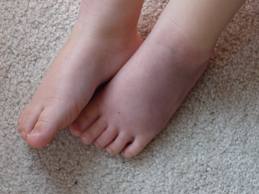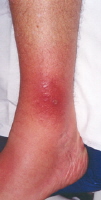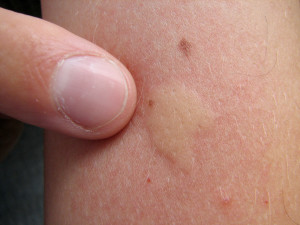Should you be worried about your mosquito bite? Is your mosquito bite an allergic reaction?
Is your mosquito bite something more serious? Some mosquito bites look harmless with a little redness and a little swelling. These symptoms often disappear as soon as they started. Sometimes the bump sticks around a little bit longer but most often it goes away quickly.
According to the Cleveland Clinic, if the following things happen, it may be cause for alarm:
- Swelling of the lymph nodes
- A wide-spreading redness around the mosquito bite
- Red streaking that extends beyond the initial bite
- Pus or drainage
- Area feels warm to the touch
- Chills
- Fever (above 100 F)
To prevent mosquito bite reactions, infections, and potential mosquito-borne illnesses, consider mosquito barrier protection.
Read below for more details about reactions vs. infections to help you identify a mosquito bite that is more than a typical skin reaction.
Reactions
Common Reaction: People often have an immediate reaction to being bitten by mosquitoes. Within 10-15 minutes swelling and itching can occur. Sometimes we have a delayed reaction a day or two later when an itchy red bump appears.
Babies and Toddlers: Small children often have large local reactions to a mosquito bite. The fatty tissue on their legs and arms tends to be more sensitive. Within minutes of a bite a large, red, swollen area can appear and will be warm to the touch. A small child can also develop bruising and blistering 2-6 hours after a bite.
mosquito bite. The fatty tissue on their legs and arms tends to be more sensitive. Within minutes of a bite a large, red, swollen area can appear and will be warm to the touch. A small child can also develop bruising and blistering 2-6 hours after a bite.
Skeeter Syndrome: Severe local reactions are called “skeeter syndrome”. An entire body part may swell within hours of being bitten. This syndrome can be distinguished from an infection by how fast the swelling, redness and tenderness occurs post bite.
Systemic reactions: Systematic reactions are very rare. Hives, swelling of the lips and mouth, nausea, vomiting and wheezing can occur when someone has a true allergy to the mosquito salivary proteins.
Local reactions can be treated with topical anti-itching solutions like Calamine lotion. In addition, steroid crèmes can be used to help with discomfort. Oral antihistamine can help to reduce swelling. It is important to resist scratching the bite. If the bite is open from scratching, ensure to use antibacterial soaps and antibiotic crème to prevent secondary infection.
Infections
Impetigo: An infection that enters the body through irritated skin. The most common bacteria that cause impetigo are staph and strep. Sores develop, often around the nose and mouth. Children tend to get this infection more often than adults.
Cellulitis: Another infection that enters the body through a skin wound. Staph and Strep are common bacterial causes. The infected area will become warm, red, swollen and tender. Red streaks can form from the area. Symptoms like fever, chills and swollen glands will develop as the infection spreads.
Staph and Strep are common bacterial causes. The infected area will become warm, red, swollen and tender. Red streaks can form from the area. Symptoms like fever, chills and swollen glands will develop as the infection spreads.
Lymphangitis: Similar to impetigo and cellulitis, this infection also enters the body through open skin, like a bug bite. The bacteria enter the body and follow the lymphatic system and rapidly multiply. Characteristic red streaks form from the infected area to the armpits or groin areas where lymph nodes are prevalent.
Infections form over time and can be treated with antibiotics. Fever will often form once infection sets in. It is important to see a doctor right away if a bite is red, swollen, blistered combined with running a fever.
Call on the professionals for mosquito control in central Mass.
To keep you and your family safe from mosquito bites and the reactions or infections they may cause, your best bet is to hire a reputable company to mosquito barrier protection.
Also read: Who’s at risk for mosquito bites?


